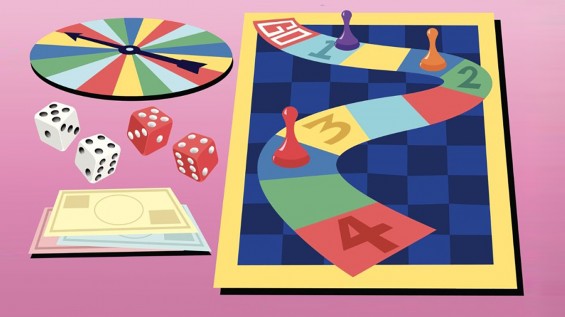
Should all students learn a second language? One TED-Ed Club member advocates for better bilingual instruction
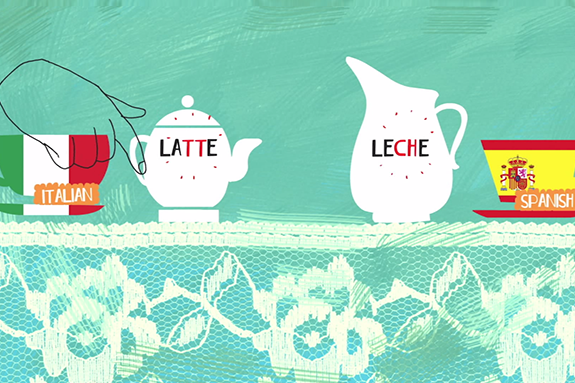
Yash Khatavkar, Fridley High School TED-Ed Club Member and high school senior, wants to see a change in the way schools approach language instruction. As a child who wanted to learn Spanish, Yash took issue with the fact that his elementary school only offered one hour of Spanish instruction per week. In his final TED-Ed Club presentation, Yash explores the positive benefits of multilingualism, and advocates for earlier and better language instruction in schools.
What was your TED-Ed Club presentation about?
My presentation was about language. I focused on how language acquisition has become more important to us and I talked about how it is taught. The main point I aimed to make is that the way schools teach language is ineffective. The way our schools treat language has not kept up with the changing role of language in society.
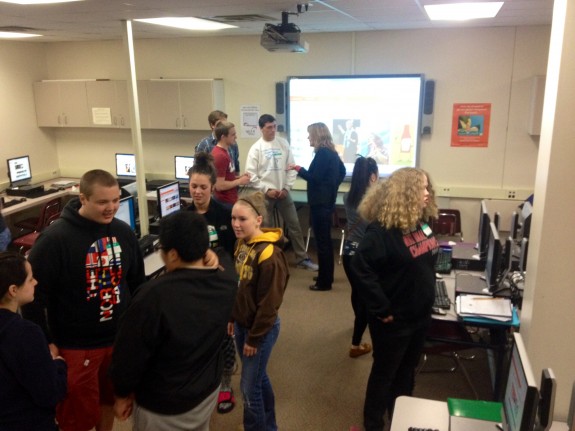
Fridley High School’s first TED-Ed Club Meeting
How did you get interested in pursuing this subject?
I actually got the idea for my presentation from a friend. He speaks five languages and often talks about the way language is taught in other countries as being more effective than the way it is taught in the United States. My parents are also from India, where people learn to speak three languages fluently: Hindi, Marathi and English. This made me realize that the way languages were taught in the American school system are ineffective and unacceptable.
Why do you think people should learn to speak more than one language?
Knowing multiple languages is increasingly important as the world becomes more and more global. Languages like Spanish are extremely useful due to the large number of Spanish speakers in the United States, but other languages are extremely important as well. Speaking someone else’s native language is not only important for things such as business and trade, but is also critical for more lofty purposes such as international understanding and transcending cultural boundaries. Speaking someone’s native language creates an instant cultural connection with them, and is absolutely essential for functioning in a more international world.
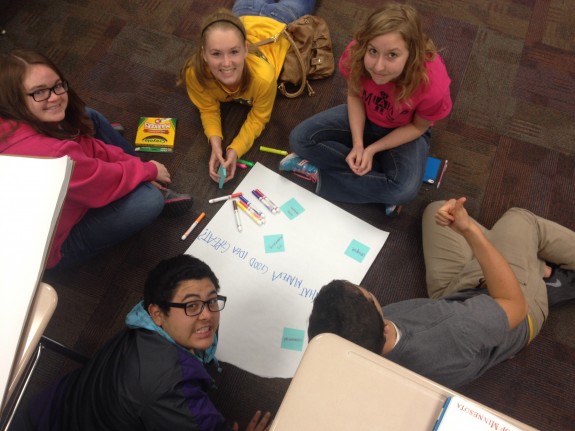
Yash’s fellow TED-Ed Club Members investigate what makes a good idea.
How did you learn to start speaking Spanish?
I actually had toys growing up that taught me some basic Spanish, including a ball that taught me to count to ten in both English and Spanish. Then, in elementary school, I was taught some Spanish in school. But there was only an hour of Spanish instruction per week, which was far from sufficient, and I didn’t learn very much. However, in middle school all the way to high school, I took Spanish classes that taught me much more Spanish. These classes helped me read and write in Spanish well, but I never got the immersion that helped my bilingual classmates (who were raised speaking both English and Spanish) speak fluently.
What was the most interesting thing you learned while working on this presentation?
I was most interested by the different ways people learned languages, both in other countries and even within the United States. These are things that I hadn’t been exposed to. By learning this, I realized that language was not something that could be learned in a classroom alone. It truly made me believe that acquiring a new language requires more than just studying it from books.
Want to start a TED-Ed Club at your school? Apply here! »

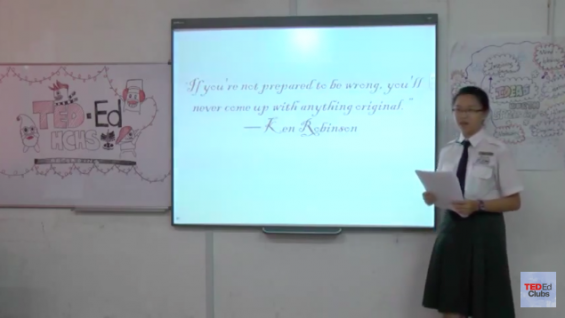


I agree with you whole-heartedly Yash. Good presentation.
Great job Josh! I am inspired to dig out my highschool spanish and start using it. I hate used it in the past in my classrooms with spanish speakers in them. It is a useful language and we all should be bilingual.
Hi! I’m Ueno. You should look at bespoke languages tuition – their French lessons, Spanish tuition and German lessons are superb. I’m an experienced English teacher and I am thoroughly impressed by their whole operation. Really superb!
i love his eyes omg <3 <3 <3
Well that depends if they know the first language to begin with.
I learn Mandarin and English during my schooling days. Learning Mandarin was different from learning English. Mandarin characters are based on historical diagrams that carry a story behind its formation while English is something like the language version of combinations and permutations. I can tell you it was very tough because no one teaches the history of words. Thus, I really struggled a lot.
It was only when I left school after so many years that I understood why Mandarin words are the way they are and how English spelling rules were intertwined with the history of Great Britain in at least the last 500 years. That was when I realised the beauty of both languages and started to re-learn them.
Should students learn two languages? Of course! It will be difficult but with the right mentors, the learning experience is doubled!
I enjoyed your article, specially when you treat the theme the way how children learn a second language. I agree with you “that´s not only from the books (including adults)how to learn a language. Idioms must be taught in a vivencial way.
in Europe iT is quit common to learn more then one language.
I’m a physics teachers at a bilingual school, where children from the age of 12 start with the following languages, dutch, german, french and a vers intensive course of English. Despoten the fact that these students hav dutch as native language, they Will be tought in English in al subjects , so math, physics, biology etc. Except the language subjects. Heer they have to talk only the language which is on the menu at that time. They have to talk , write and preferably think in English. After two year in middle school they are on A level that they are able to communicate. At the third year, they have to participate an esol exam from Cambridge University. At least FCE but preferably CPE level. Later on they Will follow the English IB programm. These students are able to communicate on A high level in both English and Dutch. A Side effect is, that they are also able to have higher Marks’ for their examen in other languages withouten haring loper Marks’ for subjects in the Science field. As students on Universities, they are able to read and understand their lectors more easily and in short time, as if they were natives.
In my opnion, you should learn at least two , but preferably three, languages extensively. To be A word citicen.
Your ideas are great Yash. Different languages increases our culture and each one of them makes us think differently about the world. Language is extremely powerful when it comes to influencing our way of thinking and our relationships, even though it might not seem so.
I agree that our School system should take languages more seriously. When we become fluent in more than one language, it is much easier to learn other ones and we can easily teach them to our future kids, letting them experience different languages much sooner than we have the opportunity to do so today.
I learn Mandarin and i love it. Yes, i agree we should learn a second language.
I don’t know this young man but I am very proud of him. He put so much work into thinking, discussing, planning, writing, editing, rewriting and practicing that he produced a very persuasive talk.
Multilingualism is a fact of life in many countries of the world. It is known how absorbent the young brain is, flexible, solution focused and open to new experiences. The Children’s Garden in Dubai UAE is maximising exactly those qualities. a bilingual preschool that is teaching children to be problem solvers and critical thinkers through language and creativity. Languages are taught through immersion and the arts, why make learning languages challenging when it can be fun and a subtle process.
The best idea is learn two different languages. In my case helps to understand your first language and the third one is easier. Once you know spanish, french, portugtese and italian have small differences. And trains you frain to realise what is a symbol and action. How they join together.
I am a Spanish teacher, PhD, with 20 years successful teaching in high schools, colleges, and universities. I helped to develop the Psycho-Generative modern language teaching method which is as superior to the teaching method in current language textbooks as a smartphone is to the telephone of twenty-five years ago. I am happy to share this knowledge free of charge
with any group that is interested in improving language teaching.
Yes, Students should learn a second language—but the current modern language teaching methodology is obsolete and retards or completely blocks the learning process for the majority of people. The Psycho-Generative teaching method, created by Dr. Samuel Nodarse, PhD, is as superior to the teaching method in current language textbooks as a smartphone is to the telephone of twenty-five years ago. It is based on a new understanding of the principles of effective teaching. I am willing to share my knowledge of Psycho-Generative with any interested group anywhere in the country free of charge.
The English First or similar movements are NOT intended to deny anyone from speaking one or more languages other than English. Rather the purpose of having an official language is to create a uniformity in documents, laws, signs, etc. so as tho clarify the printer word. I am a strong proponent of English as the official language of the USA. Pero hablo epsilon o francais as. ?Entiende?
Establishing an “official language” presumes that only English can be the standard. Why? Because the current language teaching method in schools is extremely ineffective and has only about a 20% rate of success, if that. English is the language with which many people are already comfortable and competent. Given the history of our country, we should be at least 70% bilingual in English and Spanish—and both languages should receive official status. I believe that that can be readily accomplished within twenty years. I have helped to develop a new language teaching method, Psycho-Generative, which is as superior to the method in textbooks as a smartphone is to the telephone of twenty-five years ago. Both youth and adults can learn a second language easily, rapidly, and effectively—and have fun doing so—without the inherent confusion, depression, and distress which are now part of the learning process.